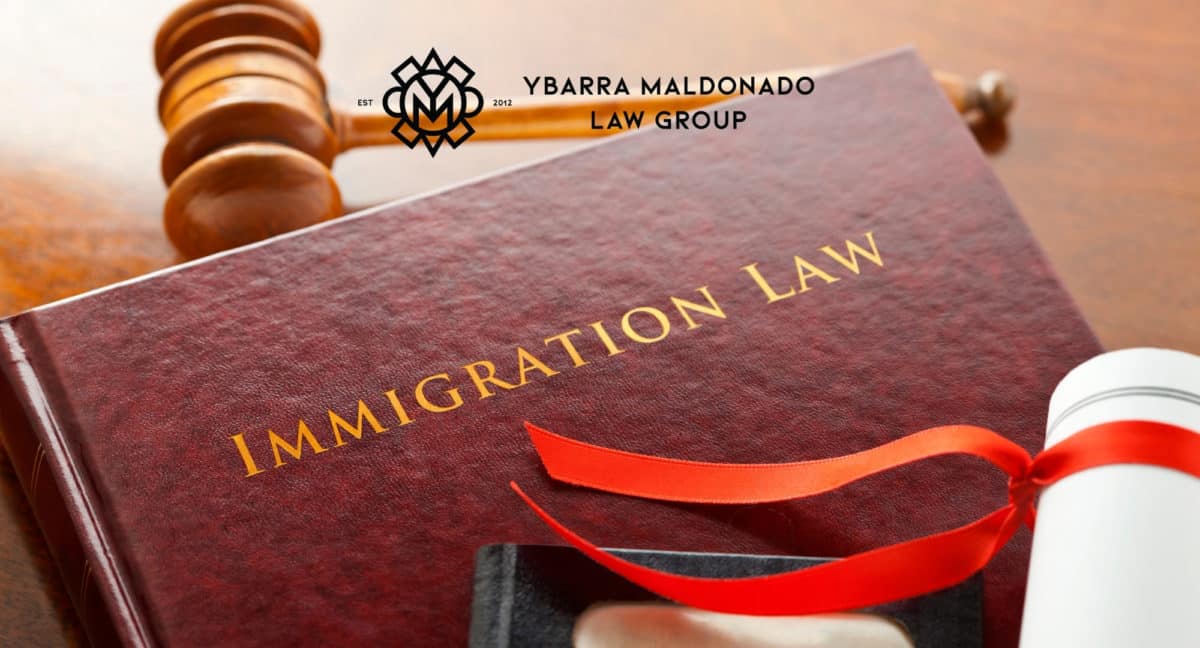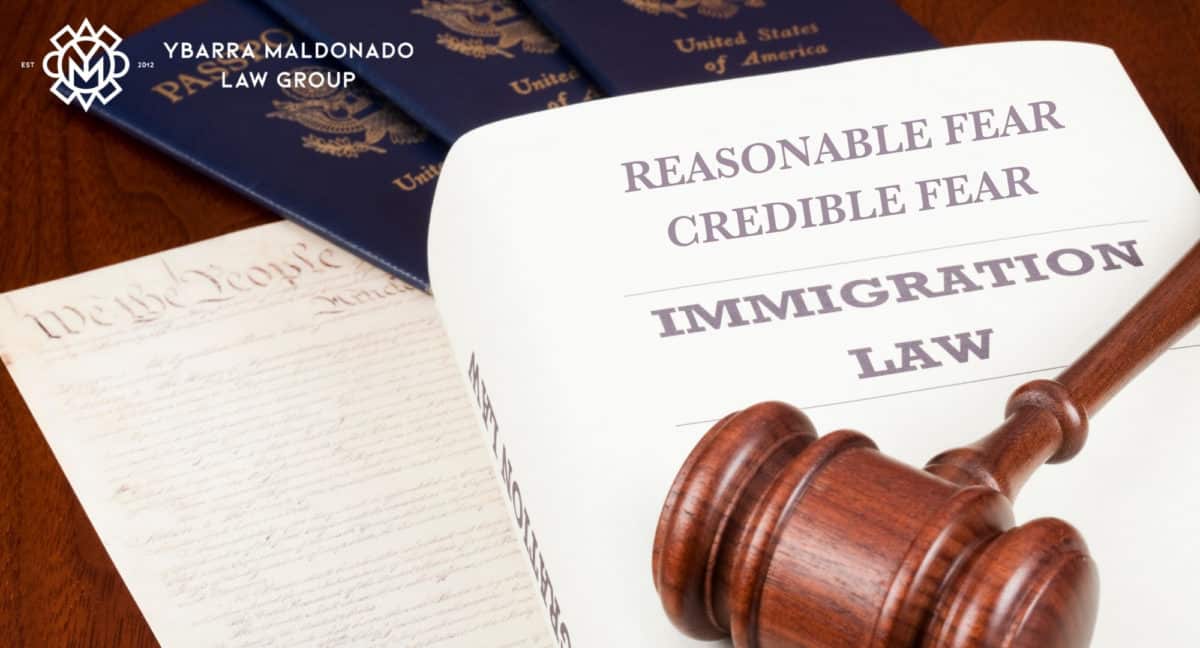CREDIBLE FEAR INTERVIEW VS REASONABLE FEAR INTERVIEW
DON’T HESITATE TO REACH OUT TO US!
Our Law Firm is committed to becoming the best Law Firm for Latino, migrant, and Spanish speaking communities in Arizona.
Reasonable Fear and Credible Fear Interview Attorney

At Ybarra Maldonado Law Group, we stand with immigrant families who are forced to flee their countries of birth because of violence. We are honored to fight alongside those who make the arduous journey away from their homeland in search of a life free of torture or persecution. Unfortunately, the United States has continued to make it more difficult for those fleeing violence to enter or remain in the country. The Trump administration used Title 42 to expel border crossers, even those fleeing violence. While the Biden Administration has continued the use of Title 42, we are still seeing numerous people placed in either reasonable or credible fear interview proceedings.
Oftentimes border agents issue an expedited order of removal for someone caught recently entering the country. Applicants seeking asylum or fear persecution or torture can establish a “credible fear of persecution” and avoid being subject to the removal order. If the person expressing fear was previously removed from the country, they would be given a reasonable fear interview instead of a credible fear interview in an attempt to avoid reinstatement of the prior order of removal.
At Ybarra Maldonado Law Group, we have an in-depth knowledge of domestic and international laws regarding asylum seekers. They have the right to prove a reasonable or credible fear of persecution or loss of life if they are deported to their country of origin. We have successfully attained grants of both credible and reasonable fear interviews and understand how the interview process works. If you find yourself or a family member in this situation, speak with a reasonable fear attorney as soon as possible. At YMLG, our Florence and Eloy reasonable fear attorneys are here for you. To schedule a case evaluation with a qualified Phoenix immigration attorney, please call 602-910-4040 today.
Reasonable Fear and Credible Fear in Asylum Immigration Cases
Reasonable fear and credible fear come into play if a U.S. immigration official either discovers a non-citizen at or near a port of entry or if a non-citizen appears before the official, for example, after an arrest for a criminal encounter within the interior of the country. The officials must determine whether or not an expedited removal process is necessary. However, what if that non-citizen is seeking asylum due to their reasonable fear of persecution or torture?
At this point, immigration enforcement officers must adhere to both domestic and international laws regarding asylum seekers. An asylum seeker has the right to prove that they have a reasonable fear or credible fear of persecution or torture if they return to their home country. Non-citizens still have a right to personal safety, which is why reasonable and credible fear screenings exist.
Credible Fear vs. Reasonable Fear

It’s important to understand the differences between reasonable and credible fear in an asylum case. Although these terms sound very similar, they have notable differences. Both terms are used by immigration officials in determining whether or not to grant asylum or withholding of removal to non-citizens.
The main difference between credible fear and reasonable fear is the prior immigration history of the person detained. Are they seeking to enter or remain in the country without having been previously removed? If the person has not been previously removed, for example, it is their first time entering the country, they will be given a credible fear interview.
If the person has already been previously removed from the country, either by means of an expedited order or an Immigration Judge ordering removal, then the person could only seek reasonable fear. Below, we have outlined the nuances of each term and how they relate to your opportunity to remain in the country.
In short, credible fear is the preferred type of interview as it has a lower standard to meet and leads to an opportunity to apply for asylum. Reasonable fear is more difficult to win and only leads to the possibility of winning withholding of removal and not asylum.
What Is Reasonable Fear?
In a reasonable fear interview, the asylum officer shall determine whether there is a reasonable possibility that the person would be persecuted or that he or she would be tortured in the country of removal. Reasonable fear is more difficult to prove than credible fear. The interview is to be conducted in a non-adversarial manner, and may even be over the telephone. An applicant may be represented by counsel. This persecution or torture must have a reasonable possibility of happening based on the following.
- Race
- Religion
- Nationality
- Membership in a particular social group or political opinion
When Do Reasonable Fear Interviews Take Place?
Reasonable fear screenings generally happen within 10 days after ICE refers your case to the asylum office. Though, they have been taking longer given the high demand. However, it’s important to remember that if you are currently detained or serving a long prison sentence, you will have to wait for your interview. You will normally have to wait until you are in ICE custody to request the interview.
What Happens at a Reasonable or Credible Fear Interview?

The asylum officer will first ask you questions about your background. Then, they will ask about your fear of returning to your home country. You will give a reason for your fears, then answer follow-up questions.
Then, they will ask why you are being persecuted. They will ask questions related to persecution based on your race, ethnicity, religion, nationality, political opinion, or membership in a certain group. It’s important to note that if you cannot tie your asylum request to persecution based on one of those categories, your request will likely be denied. Additionally, if your answers are inconsistent in any way, these inconsistencies may be used to discredit you.
Then, your interviewer will ask whether or not you have faced mistreatment or torture by an official government organization in your home country. Additionally, they will ask if there are any mandatory bars that would prevent you from applying for asylum. This includes whether or not you have committed any aggravated felonies.
Finally, the interviewer will summarize the proceedings before allowing you to make any additional comments. The interviewer should also ask your attorney if they have any questions for you. Once the interview is over, they will determine whether or not your story merits a finding of credible or reasonable fear.
What Is Credible Fear?
Credible fear has been defined to mean that, taking into account the credibility of the statements made by the person in support of their claim and such other facts as are known to the interviewing officer or immigration judge, there is a significant possibility that the person could establish eligibility for asylum, withholding, or CAT.
Credible fear is a believable fear of prosecution or torture that a detained non-citizen faces upon return to their home country. In contrast to reasonable fear, credible fear applies to non-citizens who have not been previously removed from the country. It is an easier standard to meet than the standard for reasonable fear.
When Do Credible Fear Interviews Take Place?
Credible fear interviews occur after you have been placed into expedited removal and then into ICE detention. Your interview will occur while in detention, within 10 days after your case is referred to the asylum office. Though, some interviews have been taking longer to schedule, given the backlog of requests.
Preparing for the Credible Fear Interview
Having an experienced immigration law firm prepare you for your interview can make the difference between staying in this country or being returned to your country of origin. We often hear from people who have already had their interviews, and they were not even aware. They are told they have a phone call and think nothing formal is happening, but an asylum officer is actually interviewing them on the other side of the country.
With the help of your attorney, you can prepare for your credible fear screening process and increase your chance of successful approval. Upon being retained, we schedule a visit with you or your loved one to explain to them the credible/reasonable fear process and the standard being adjudicated by the asylum officer.
We also notify the asylum office that we would like to be present during the actual interview. In our numerous years of experience, we have found that the best way to prepare is a mock interview. One of our experienced team members can play the role of the asylum officer and ask the questions likely to be asked during the interview. This will give you or your loved one an opportunity to understand how best to present their case to the asylum officer.
Before the interview happens, the asylum officer will read the notes they have regarding your situation. Often, they know very little about your case, so you must be prepared to tell your entire story again. If you originally claimed asylum, you need to keep all of your facts and details straight. We recommend writing down your story to maintain consistent testimony throughout the process. It is rare for applicants to have ample documentation or concrete evidence of their claims, so a high-quality testimony is crucial.
While you only have 48 hours to prepare, you will likely have more time to prepare than that. In many cases, detainees will wait days or weeks before their interview happens. The sooner you hire an experienced law firm, the longer you or your loved one can prepare for your interview.
What Happens After a Credible Fear Interview?
After a credible fear interview, the interviewer can make one of two findings: positive or negative. A positive finding means that there is a reasonable or credible fear of persecution or torture if the individual returns to their country of origin. At this point, they may attend an asylum merits interview and apply for asylum before an immigration judge. This begins the asylum process.
A negative finding means that there is no reasonable or credible fear of persecution or torture if the individual returns to their country of origin. At this point, they may appeal the decision to an immigration judge. If they choose not to appeal, or if the appeal is unsuccessful, they may be subject to deportation or removal proceedings.
Can You Appeal a Credible Fear or Reasonable Fear Interview?
In general, there are two ways in which you can appeal an interview denial. The first option is requesting a review of your case by an immigration judge. The second is requesting a new interview from the asylum office. Our office has successfully gotten negative reviews overturned in front of an immigration judge. If your loved one’s interview was denied, please call our office immediately at 602-910-4040.
How to Pass a Credible or Reasonable Fear Interview

Tell your story. Remember that credible fear requires a significant possibility that the applicant could establish eligibility for asylum under section 208. If successful in winning the credible fear interview, then you will have an opportunity to apply for asylum. If you successfully win your reasonable fear interview, then you can attempt to win withholding of removal.
Preparation and consistency are two of the most important factors in reasonable fear interviews. If you can provide a strong, consistent testimony about your fears, you may apply for withholding of removal proceedings or relief under the Convention Against Torture.
Credible Fear Interview
Passing a credible fear interview involves demonstrating a credible and legitimate fear of persecution or torture if returned to your home country. Some tips for having a better chance at a positive credible fear interview include the following.
- Be truthful and consistent about your situation and story
- Gather all supporting documents
- Understand what counts as persecution as it relates to your situation
- Clearly state the reasons why you fear persecution, such as listing specific incidents or threats
- Be prepared to discuss details about your personal life
- Seek help from experience legal representatives
- Stay calm and focused during your interview
Remember, passing a credible fear interview does not guarantee asylum, but it is the first step in the process.
Reasonable Fear Interview
A reasonable fear interview is conducted for individuals who have been previously deported, removed, or have a prior immigration violation and are seeking withholding of removal or protection under the Convention Against Torture (CAT). To pass a reasonable fear interview and establish eligibility for further proceedings, individuals must demonstrate a reasonable possibility that they would be persecuted or tortured if returned to their home country.
Preparing for a reasonable fear interview involves steps that are very similar to preparing for a credible fear interview. In addition to the tips for passing credible fear interviews, we recommend preparing for cross examination with your attorney. One way to do this is by participating in mock interviews with your legal team.
What Will Happen if the Asylum Officer Finds a Reasonable or Credible Fear?
The asylum officer will then refer your case to an immigration judge. This judge then determines whether or not you are eligible for withholding or deferral of removal proceedings. A recent change is underway to have an asylum officer make the determination instead of the immigration judge. Either way, it will be important to be well-prepared to tell your story to either the asylum officer or the judge.
What Will Happen if the Asylum Officer Does Not Find a Reasonable or Credible Fear?
If the asylum officer determines there is no reasonable or credible fear, you can still request a review from an immigration judge. However, if you do not request a review, or if the immigration judge agrees with the negative decision on your case, you will be deported by ICE.
However, if the immigration court reverses the original negative decision, you are entitled to a full hearing. This hearing will determine your eligibility for withholding or deferral of removal. Once a decision is made for this hearing, you may be able to further appeal to the Board of Immigration Appeals if you do not win your asylum or withholding case.
Contact a Phoenix Immigration Attorney To Protect Your Rights
If you are facing life-changing immigration proceedings, you need the experienced immigration lawyers at Ybarra Maldonado Law Group. We have extensive experience handling immigration appeals, reasonable fear interviews, credible fear interviews, appeals of denials of reasonable/credible fear interviews, asylum cases, withholding cases, and even criminal defense cases. Our immigration attorneys are standing by to represent you and defend your rights as an asylum seeker. To schedule a case evaluation with us, please call 602-910-4040 today.
